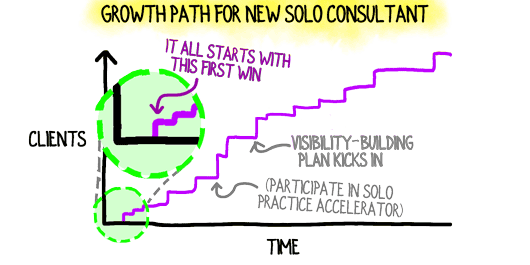As a consulting firm leader you encounter youngsters and corporate folks who gaze on your practice with admiration and ask you what it takes to start a consulting firm. Your answer can be refreshingly simple.

A simple Google search reveals 13.83 bazillion gurus and marketers who offer tidy packages and courses for startup consultants. They cover all the basics of incorporating, basic accounting, websites, templates for proposals and deliverables, subcontracting and more.
Those are all distractions. There’s only ONE thing you need to start a consulting firm.
A client.
If there’s someone willing to pay you to help them solve their problem or achieve their aspirations, you’re off and running as a consultant. Absolutely nothing else needs to be in place.
Then, only after you have a client, you can work on the next thing you need to start up a consulting firm:
A chocolate snack, then another client.
Then another. (Client, not snack.)
Before you create any infrastructure at all, including websites, etc., you should win at least three clients.
Perhaps you should set up a corporate entity to shield you from liability. You can consult an attorney about that. My observation (not legal advice) is that out of the hundreds and hundreds of start-up consultants I’ve encountered, exactly none have ever faced legal action from their first few clients.
Once you’re landing clients, you can deliver whiz-bang results, earn a tidy income and build yourself a consulting firm.
Conversely, if you pour energy and money into creating infrastructure, then find you can’t land clients, your reward is the bitter taste of unfulfilled intentions, not a consulting practice.

Admittedly, once you’re up and running, there are a plethora of requirements and best-practices to build a sustainable, thriving, professional consulting business. And yes, there is plenty to learn and implement if you want to scale your consulting firm.
However, the starting place is very easy. Win clients.
Do you agree with that advice for colleagues who want to start their own consulting practice? What else would you tell them?
Text and images are © 2024 David A. Fields, all rights reserved.

 David A. Fields Consulting Group
David A. Fields Consulting Group 

Hi David,
Good stuff! For me, in addition to “fishing where the fish are”/fulfilling a market need, I’ve found that it’s important to do something I love to do. This becomes especially important when I hit a rough patch (e.g., lack of clients) and start to wonder what I was thinking when I launched my consulting practice. Then I remember that I get great joy from my work and get back into client acquistion mode with renewed vigor.
Excellent point, Doc. While consulting can be very rewarding, it can also be discouraging, frustrating, lonely and downright difficult. You have to gain enough energy from the sunshiny days to push through the dreary, rainy, stormy days that blow into every consulting practice.
I’m glad you added your wisdom to the discussion, Doc!
Hi David.
Good advice, as ever.
I was a little more risk averse and set up a single member LLC straight away. It was simple to do and didn’t require an attorney.
I also took out professional liability insurance – again straightforward, and not stupidly expensive for peace of mind.
Like you, I’ve rarely heard of any consultant (of any size) being sued – but a brand new consultant may not yet have learned how to avoid that.
But with those two minor caveats, I completely agree: focus on the client and the rest will follow.
Those are very fair startup steps, Alan. Launching a consulting practice can be fraught with anxiety. Also, it’s hard to focus on the client when you’re petrified of potential downsides. So, if a couple of quick, simple steps will markedly reduce the stress, then take them.
Outstanding contribution, Alan. Thank you!
I recommend liability insurance as well–not because of the protection, which of course is nice, but because it can be a ticket in to certain clients. The “big guys” often have rules that their consultants need to carry Mistakes and Omissions insurance. If your first few clients are folks you know from your BigCo job you quit to go consulting, this can be really handy. Frankly I seek clients that operate more informally, but I’ve had a few early ones where it was a gate. Most typically require $1M in coverage…I’m currently paying around $60 a month for that. (Note that clients who require $5M minimum may not be worth it–my insurer has told me that it’s very difficult to get that kind of coverage at all, for what it’s worth.)
Thanks for the post, Troy. Who is your provider for the liability insurance?
No problem, Joe! I’ve been very satisfied with Hiscox. Friendly and a great experience to set up.
Thanks for providing that information, Troy!
You’re right, Troy, though I would suggest the order of operations is: first, land the (very interested) BigCo opportunity, then get the insurance needed to close the deal.
Outstanding input, Troy. Thanks for your insight!
What do I need to be a consultant?… a client? Cute, however, I think not.
Ah, a consultant, doing something between “real jobs” to get a real job again. David, no doubt well intended, your offer this time is part of the problem with so called “consultants” and mopping up the bad work done by said “consultants” time after time after time, year after year. Enough. Consulting is a profession and there IS a skill set beyond giving a list of answers to some limited questions. Sad for the profession, horrific for the clients that know no better and sad for those of us that do the mop up that typically follows.
Your frustration with consultants who deliver poor-quality work is well noted, Rudy. Of course, as we both know, there’s a difference between the only thing you need to start a consulting firm (the topic of this article) and what you need to do a good job and build a practice.
Your statement is a good reminder for wannabe consultants that there’s more to building a practice than winning an engagement. Thanks for the contribution today, Rudy.
Spot on, David. I started my practice in 2012. When I started, I had lunch with a business owner buddy of mine. I was telling him what I was up to. He said, “Joe, El numero uno.” What??? “Go get your first client.” And that’s what I did. For the first two years, I had no website and a gmail email address. The only thing I did prior to getting clients was setting up an LLC and a bank account.
Boom! And from those humble beginnings you became the successful consultant you are now!
I appreciate you providing the on-point case study, Joe. Very inspiring.